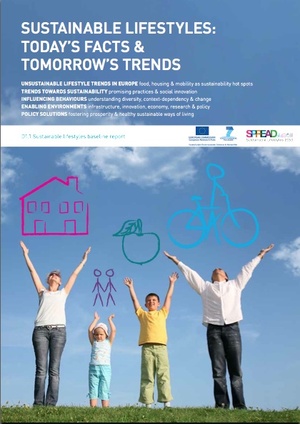
Initiatives and social innovation inspire a shift to sustainable lifestyles in 2050
New report of CSCP led SPREAD project finds that a growing number of people across Europe are changing the ways in which they live, move, and consume.
According to the report Sustainable Lifestyles: Today’s Facts & Tomorrow’s Trends, many initiatives, policies, businesses and social movements have accumulated in Europe in the last decade which have motivated citizens to change their lives to higher quality, less impact on the environment, and less costs. The report prepared by the CSCP coordinated EU project SPREAD Sustainable Lifestyles 2050 presents a synthesis of research, leading policy and practice, and stakeholder views on potential pathways toward a further spreading of sustainable lifestyles.
Examples of changing lifestyles are showing across Europe: Car and bike-sharing initiatives across the EU, local food chains, urban farming, eco-villages, and travel agencies offering stay-cations. More and more people live in ‘passive’ energy efficient houses, or install solar water heaters (to 75% on Malta). Dynamic buildings are a new trend. Such buildings respond to changing weather and adapt indoor conditions. Smart meters not only make energy conservation but also energy production at home easier. Neighbourhoods emerge around the principles of sustainable living. Cities adopt urban planning policies to decrease the need for cars and transport. The emergence of an experience economy is demonstrated by the growing interest in gifts such as massage treatments, instead of goods. Consumption appears to be partially moving towards products of increased quality and endurance which are serviced instead of being discarded.
Many examples are marginal rather than mainstream but reveal future trends. Current lifestyles are still largely unsustainable and based on overproduction and overconsumption. More meat and dairy is consumed, people live in larger homes with fewer inhabitants. Increasing numbers of people are confronted with obesity and heart disease.
Saving the environment and saving money
The future potential and the challenges for sustainable lifestyles are huge. Misperceptions like “a sustainable lifestyle is costly” or “a sustainable lifestyle decreases the quality of life” are still widely spread. Benefits of sustainable lifestyles are not broadly recognized. Many initiatives towards sustainable ways of living, however, can bring multiple benefits: not only energy and/or resource saving, but also improved social relationships, enhanced comfort and safety, saving on parking space and costs and so on. They exemplify and point towards changes in lifestyles which are not just about ‘saving the environment’: people are saving money, they are healthier, happier, more socially engaged and using new technologies to make their lives more efficient.
Making it easier to change our behaviours The report suggests two pre-conditions to mainstream, upscale and multiply current examples of sustainable ways of living: First, individuals need to become more aware of the social, economic and environmental implications of all choices and behaviours. There is no ‘one size fits all’ solution as to how to motivate people to behave and live more sustainably. Successful sustainability initiatives are those that try to understand how to motivate and enable behavioural change among different groups of people. Second, societies should facilitate sustainable lifestyles as the effortless norm. Too often, the sustainable alternative is still the most difficult one to perform. For mainstreaming, sustainable lifestyles need to be easy, convenient, accessible and enjoyable. This requires the development of appropriate infrastructure (e.g. to encourage walking and cycling) and context-specific solutions (e.g, communal rental bikes in Paris, Barcelona, London).
To read the final report “Sustainable Lifestyles: Today’s Facts and Tomorrow’s Trends” please click here. If you have less time, than read and print only the Executive Summary of “Sustainable Lifestyles: Today’s Facts and Tomorrow’s Trends”. This short version is available here.
For more information about the SPREAD Sustainable Lifestyles 2050 European Social Platform Project click here
